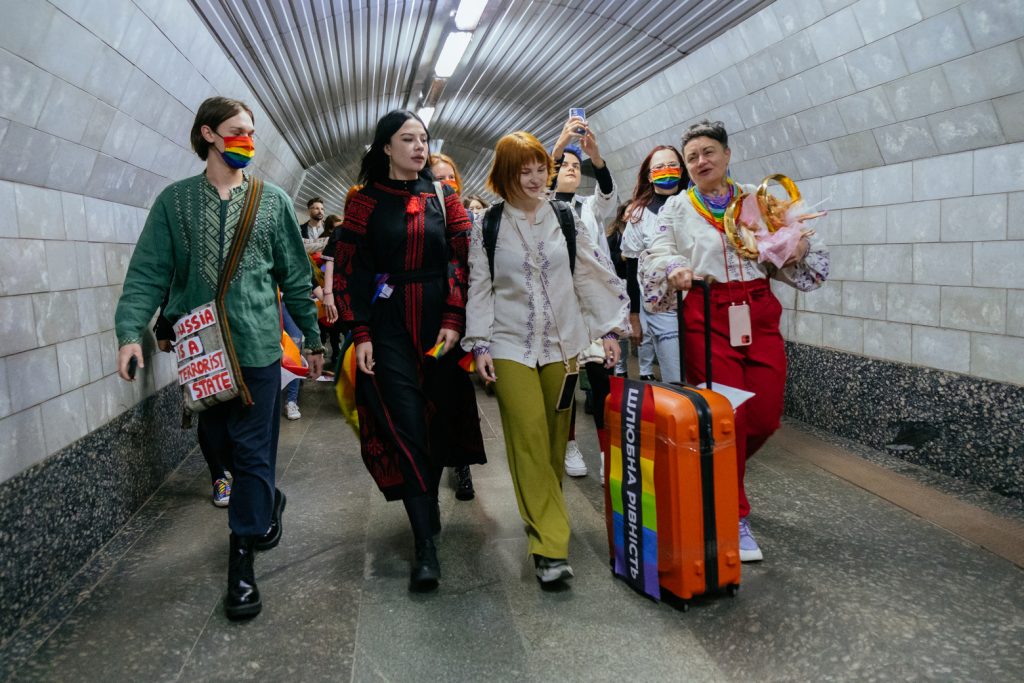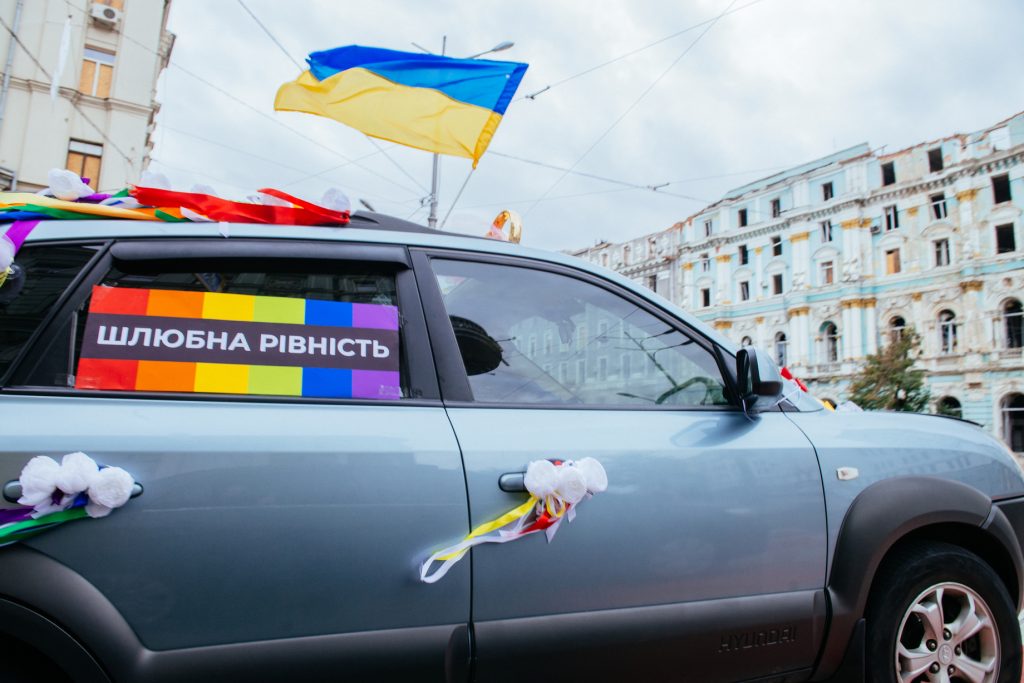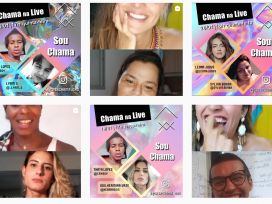Civil rights in wartime: Legalizing same-sex unions in Ukraine
On 14 March, a bill for the legalization of civil partnerships was submitted to the Ukrainian parliament. Even though activists see it as a compromise on full marriage equality, it would grant same-sex unions vital recognition under martial law.
In the summer of 2022, an online petition to legalize same-sex marriage in Ukraine gained wide publicity among Ukrainians and the broader international public. On 9 July, it reached the required 25,000 signatures. ‘At this time’, the petition laconically stated, ‘every day can be the last. Let people of the same sex have the opportunity to start a family and have an official document to confirm it. They deserve the same rights as traditional couples.’
According to Article 51 of the Constitution of Ukraine, ‘marriage is based on the free consent of a woman and a man.’ On 2 August, president Volodymyr Zelenskyy responded to the petition, saying that while it was impossible to change the Constitution under martial law, there was an alternative to same-sex marriage: civil partnership. He assigned the issue to the cabinet of ministers.
A study by the Centre for Social Expertise of the National Academy of Sciences shows that the level of support for same-sex marriage has almost doubled among Ukrainians in the last 10 years: in 2022, 53% of respondents declared themselves in favour, compared to 33% in 2013. However, the political will to introduce civil unions remains unclear, despite the war making the issue even more urgent. Moreover, many LGBT activists consider civil partnerships an insufficient step in the fight for equal rights.
Fight for acceptance
The Mykolaiv Association of Gays, Lesbians and Bisexuals ‘LiGA’ and the Regional Information and Human Rights Centre for Gays and Lesbians ‘Our World’ were the first LGBTQ+ organizations in Ukraine. When they were established during the 1990s, activities took place in small groups and at the activists’ own risk, since the attitude of wider society tended to be hostile. Nevertheless, the representatives of LGBTQ+ communities began to appear in public more and more often.
In 1997 artist Kost Hnatenko came out on the TV show ‘I’m not a monster’, This was the first public coming out in Ukraine and it paved the way for other members of the community to do the same. LGBTQ+ rights groups started to appear across the country. In the early 2000s, the movement began to hold various thematic conferences. In March 2012, an attempt was made to hold a Pride march in Kyiv. It ended in violence, with activists brutally beaten live on TV.
The following year, the pride march took place successfully. It was a historic moment. The dangers for LGBTQ+ activists had not disappeared, and social and official attitudes remained the same, but a process was underway: the LGBTQ+ community started to gain visibility and demand its rights more vocally.
While LGBTQ+ movements almost completely disappeared in the Russian-occupied territories of Donetsk, Luhansk Oblast, and Crimea after 2014, the yearly ‘March of Equality’ has been gaining numbers in the rest of Ukraine. The community also achieved important victories in the fight for equal rights: in 2016, for instance, the ban on blood donations from homosexual men was abolished.
In addition, LGBTQ+ activists have been regularly conducting research on their communities in recent years. On the rise are not only private initiatives of scientists within the framework of LGBT organizations, but also independent research groups, scientific publications and higher education projects focused on the LGBTQ+ community.

The Kharkiv LGBTQ+ community holding an underground pride march in the metro in September 2022. Photo by Yakiv Rybkin, Sfera NGO.
In the post-Maidan period, LGBTQ+ activism manifested itself in various forms, including the activities of community centres, the organization of parties, educational and human rights events, and rallies.
Civil partnerships at times of war
Since the beginning of Russia’s full-scale invasion, the legalization of same-sex unions has become a highly pragmatic issue. During wartime, situations are frequent in which relationships require official recognition by the state. Civil unions allow individuals to be informed of their partner’s injury, capture or death.
In the absence of a partnership’s legal recognition, it is the next of kin – typically the parents – who are informed, even when the relationship was conflictual as a result of family members not accepting the person affected for who they are.
In one instance, a woman from Bucha declared that she would marry a soldier who had been in a homosexual relationship for 15 years. If something had happened to him at the front, the wife would be the only one to be informed. Episodes like this contributed to raising the issue of same-sex partnerships in wartime. ‘It is very unfair that people risk their lives for the freedom and independence of a country that has not yet granted them equal rights,’ said Tetiana, communications manager at the NGO Fulcrum UA.
Changes in legislation are also necessary to align Ukraine with EU standards. A ruling by the European Court of Justice requires member states to recognise same-sex marriages performed within the EU and including an EU citizen. The Ukrainian state currently recognizes same-sex marriages and civil partnerships between foreigners registered abroad. If one of the partners is Ukrainian, however, the union loses its legal force in Ukraine.
Lessons from other countries
Civil partnerships are legally recognized arrangements that guarantee some or most of the same rights of marriage. They are introduced primarily to ensure equal rights for same-sex couples when it comes to joint ownership, property inheritance, recognition abroad, social security and benefits for families, hospital visits, burial., etc. ‘For instance, if someone is admitted to intensive care, only the closest relatives can visit. Same-sex partners are unrelated according to Ukrainian law,’ explained Tetiana.
Compared to marriage, civil partnerships are a simpler alternative that can be easily entered into and dissolved. They do not give the right to joint adoption, family surname, etc. Therefore, many LGBTQ+ rights advocates argue that they do not ensure complete equality for same-sex couples.
As of March 2023, 34 countries worldwide allow same-sex marriage. In several cases, the legalization of civil partnerships has been an intermediate step towards that of marriage. In different countries, civil partnerships have various names and define diverse rights and obligations of the partners. In Italy, civil partnerships have been allowed since 2016 – nine years after the first attempts to legalize civil relationships. The law took one year to pass, and discussions continued afterwards.
The Estonian example
In Estonia, the first post-Soviet country to allow same-sex relationships, the first attempts at legalization were made back in 2006.
In July 2009, the Estonian Ministry of Justice prepared an analysis of the legal regulation of non-marital same-sex and different-sex cohabitation, allowing Estonian LGBTQ+ organizations to add their revisions and suggestions for improvement. A draft law on cohabitation was announced in 2011. The bill was supposed to be considered at the autumn parliamentary session of the same year, but the first reading only took place on 17 June 2014.
On 8 October, despite opposition from national-conservative parties, the draft law was passed in the second reading. The following day, the third reading and adoption of the law on cohabitation took place with 40 votes in favour and 38 against. On the same day, Estonian President Toomas Hendrik Ilves signed the law, which entered into force in January 2016.
‘Each time we are told who Ukraine should look up to, I say that we should take the best of what others have. What we need is political will, information campaigns, media allies, and opinion leaders who explain that it is normal to adopt same-sex unions for a country that is fighting for democratic values,’ said Tetiana.
Where civil partnership fails
While many people support the idea of civil partnerships and call on the authorities to speed up the process, some activists disagree. Yakiv Rybkin, co-organiser of KharkivPride and a member of the NGO ‘Sfera’, conceded that ‘in general, it is a very interesting development that the petition gained so many votes in the summer and that president Zelenskyy finally commented openly on LGBT issues, while his previous statements had been vague.’ However, the activist shares fears that Ukraine may be stuck in civil partnerships for a long time: ‘For me, they are a half-measure that is not about equality, but segregation,’ Rybkin argued.

Sfera and KharkivPride activists advocating for marriage equality in Kharkiv, 2022. Photo by Yakiv Rybkin.
Last year, ‘Sfera’ and ‘KharkivPride’ organized a flash mob performance in which Rybkin and other activists took a car and dressed it up for a wedding, adding rainbow flags and writing ‘marriage equality’ before driving it around the centre of Kharkiv. According to Rybkin, only by extending marriage to same-sex couples can the discrimination against LGBTQ+ people be brought to an end.
Of course, it is better to have civil partnerships than nothing. But the danger is that the war will be over and Ukraine will be stuck with civil partnerships for decades to come, activists claim. ‘We need to talk about it and weigh all the risks. At the strategic level, partnerships will not give us a path to same-sex marriage. But they can help protect Ukrainian citizens, both those who are at war and civilians suffering from Russian aggression,’ concluded Rybkin.
Prospects for Ukraine
The rights included in civil partnerships vary widely from country to country. In Ukraine, the outcome of the ongoing debate depends on the parliament and the government. Different communities and interest groups are currently lobbying on the issue, and some LGBTQ+ organizations are cooperating with the government or individual MPs.
Draft law number 9103 on civil partnerships was registered in parliament on 13 March, and submitted to MPs the following day for examination. The document refers to civil unions as ‘registered partnerships’. The bill was initiated by six MPs from the ‘Voice’ and twelve from the ‘Servant of the People’ parties. According to ‘Voice’ MP Inna Sovsun, the author of the draft, ‘Martial law can last for years, and changing the Constitution would be challenging even without it.’
Sovsun, however, is convinced that civil partnerships are a first, important step towards the legalization of same-sex marriage and adoptions.
According to the draft law, which would apply to both same-sex and heterosexual couples, civil unions would require official registration through the registry office. The application would be submitted either in person or through Diia (a mobile application and online portal that provides digital access to 120 government services) by mutual agreement. Termination is possible both by joint application and at the request of one of the parties (in this case, through the court). Automatic termination would occur in the event of the death of one of the partners or marriage between the registered parties.
The rights and obligations of the partners would be defined, as well as property and inheritance issues regarding joint property, social security, etc. For example, registered couples would be allowed to legalize long-distance relationships. After registration, they would be considered the closest relatives and first heirs, just as in marriage.
Ukrainian civil society and the expert community should do everything possible to ensure the law is adopted as soon as possible in 2023. On 14 March, the draft law was submitted to MPs to be reviewed.
The main unknown factor is the political will to proceed. It remains to be seen whether the parliament can gather the 226 votes necessary for the law to be approved. The government, meanwhile, is preparing another draft law on the issue, but almost eight months after president Zelenskyy responded to the petition, no information is available on when precisely the document will be ready.
Bill number 5488, which classifies offences committed on the basis of sexual orientation as hate crimes, provides a hardly encouraging antecedent: the draft has been pending for years without being approved.
‘It is essential not to lose the enthusiasm and understand that this is not a one-time thing, but a long-term struggle many countries have gone through,’ argued Sovsun. ‘Talk to your friends and acquaintances who do not have a position or are categorically against same-sex unions, because the final decision depends on society.’ To speed up the process, concluded Sovsun, Ukrainians should ‘not be afraid to speak out publicly’ and show the political leadership that there is overwhelming support for such legislation. Both civil society and the expert community should do their part.
Published 31 March 2023
Original in Ukrainian
First published by Eurozine (English version); Gwara Media (Ukrainian version)
Contributed by Gwara Media © Denys Glushko / Daria Lobanok / Gwara Media / Eurozine
PDF/PRINTPublished in
In collaboration with
In focal points
- The end of Tunisia’s spring?
- Protecting nature, empowering people
- Albania: Obstructed democracy
- Romania: Propaganda into votes
- The myth of sudden death
- Hungary: From housing justice to municipal opposition
- Czech Republic: Velvet contradictions
- Armenia: Light in the dark?
- Moldova: End of the experiment?
- Serbia: Setting sail for Brussels, tying up in Moscow
Newsletter
Subscribe to know what’s worth thinking about.
Related Articles

The Eurozine series ‘The writing on the wall’ provides insights from analysts in Europe’s east into the political situation in their countries, over a year into Russia’s attack on Ukraine.

Protecting nature, empowering people
Environmental protests in the Balkans
The success of recent protests against extractivism and ecosystem degradation in Serbia and Albania highlights the potential for democratic reinvigoration around ecological issues in south east Europe. But the EU has yet to prove it can act as a credible partner in this process.






